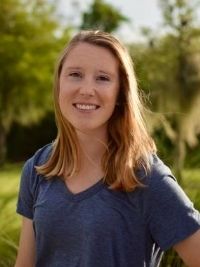Kristine Dye
Assistant Professor
Kristine Dye, PhD, is a virologist and molecular/cellular biologist who investigates mechanisms by which viruses perturb normal cellular functions resulting in the development of disease and/or cancer. She believes having the perspective of disease allows you to gain a greater understanding and appreciation for the beauty and complexity of biology. She has a strong belief that topics relating to virology, immunology, molecular/cellular biology, evolution and cancer should be accessible and explored by everyone, rather than the few. Such understanding allows students to view the world, and its current issues and discoveries, in a different, more appreciable light.
- PhD, Pathobiology, University of Washington
- BS, Microbiology, Brigham Young University - Idaho

Biography
After growing up in Florida, Kristine Dye, PhD, moved to the North West to attend BYUI. As an undergraduate, she was unsure of what career to pursue until she was introduced to microbiology as an undergraduate elective course. Dye fell in love with microbiology and quickly changed her major to biology with a minor in microbiology, became the university microbiology tutor for the next three years, and began researching Herpes Simplex Virus reactivation with Dr. Seth Ririe before graduating with a BS in Biology and a minor in Microbiology. From here, Dye went on to pursue her PhD in the interdisciplinary Pathobiology PhD program at the University of Washington in Seattle, Washington. There, she continued her work studying viruses with an emphasis on viruses that cause cancer at the Fred Hutch Cancer Research Center with Dr. Denise Galloway. Dye's primary research interest is elucidating mechanisms of cellular transformation and tumorigenesis by Merkel Cell Polyomavirus, the etiologic agent of 80% of Merkel Cell Carcinomas, a skin cancer 3x more deadly than melanoma.
While in graduate school, Dye continued practicing her love of teaching working as a TA, mentoring graduate, undergraduate and high school teachers in the lab, and teaching undergraduate courses at UW. She also was accepted and participated in the Science Teaching Experience Program (STEP) and Science Education Partnership (SEP) during her time at UW. In 2020, she graduated with a PhD in Pathobiology from the University of Washington, before starting her career at Stetson University.
At Stetson University, Dye has developed several courses, including Immunology and Vaccinology, Virology of Spillover, and Mechanisms of Disease, in addition to teaching Introductory Biology I and Senior Research. In addition to teaching, Dye continues her research of oncogenic viruses with dozens of students to further their training, education, and competitiveness post-Stetson. As a result of performing research in the Dye Lab, many students have presented and won awards at University, State, and National Conferences, and published peer-reviewed articles. Together, these experiences and the mentorship of Dr. Dye have facilitated the acceptance of many students to various post-graduate programs, including PA, Medical, and Graduate School.
More About Kristine Dye
Area of Expertise
- Virology
- Immunology
- Cancer
- Molecular Biology
- Cellular Biology
- Evolution
Course Sampling
- Virology of Spillover
- Immunology and Vaccinology
- Mechanisms of Disease and Prevention
- Introductory Biology I
- Senior Research
- Health and Wellness
- The mechanisms by which Merkel Cell Polyomavirus (MCPyV) leads to the development of Merkel Cell Carcinoma (MCC).
- Pandemic tracking of SARS-CoV-2 in wastewater including quantification and whole genome sequencing.
- The antibody dynamics to SARS-CoV-2 during the primary vaccination series.
- Landazuri Vinueza J, Salisbury NJH, Dye KN, Roman A, Galloway DA. 2025. Delta-catenin is required for cell proliferation in virus-positive Merkel cell carcinoma cell lines but not in human fibroblasts. mBio 16:e00832-25.
- Thevenin, K.R., Tieche, I.S., Di Benedetto, C.E. et al. The small tumor antigen of Merkel cell polyomavirus accomplishes cellular transformation by uniquely localizing to the nucleus despite the absence of a known nuclear localization signal. Virol J 21, 125 (2024).
- Jimenez, B. S., Sterling, T., Brown, A., Modica, B., Gibson, K., Collins, H., Koch, C., Schwarz, T., & Dye, K. N. (2024). Protocol to longitudinally quantify SARS-CoV-2 RNA in wastewater using RT-qPCR and pepper mild mottle virus normalization. STAR Protocols, 5(2), 103001.
- Jimenez, B. S., Sterling, T., Brown, A., Modica, B., Gibson, K., Collins, H., ... & Dye, K. N. (2023). Wastewater Surveillance in the Covid-19 Post-Emergency Pandemic Period: A Promising Approach to Monitor and Predict Sars-Cov-2 Surges and Evolution.
- Dye, K. (2023). Developing scientific literacy with a cyclic independent study assisted CURE in detecting SARS-CoV-2 in wastewater Journal of Microbiology and Biology Education, e00147-23.
Dye, K. N. (2020). Elucidating mechanisms of transformation and tumorigenesis by Merkel cell polyomavirus tumor antigens. University of Washington. - Dye, K. N., Welcker, M., Clurman, B. E., Roman, A., & Galloway, D. A. (2019). Merkel cell polyomavirus Tumor antigens expressed in Merkel cell carcinoma function independently of the ubiquitin ligases Fbw7 and -TrCP. PLoS pathogens, 15(1), e1007543.